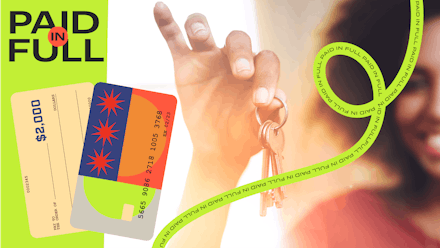How I paid off my debt and bought a house 2 years after college

For most of us, debt is a necessary evil. Paying it off can be one of the most freeing, empowering accomplishments in the world, worthy of celebration. Mic's new series Paid in Full tells the stories of these triumphs, and just might help you figure out how to get to balance zero, too.
Name: Juleen
Age: 25
City/state: Baltimore, MD
Amount of debt: $17,500
Type of debt: student loan
How long it took to pay off: 6 years (including 4 years of college)
Jobs held while paying the debt: administrative fellow and now programmer analyst
I grew up in Jamaica, in a low-income family. My family did not teach me much about money, but I did grow up with basic saving habits. At 18, I decided to pursue my undergraduate degree in computer science and my financial aid package, which was otherwise very generous and came with 100% of financial need, included a loan each semester. It wasn’t a difficult decision to take it on.
The loan had a 5% interest rate while I was in college which increased to 9% upon graduation. I always meant to pay off the loan as soon as I could, so I actually started repaying it while in college. I worked almost every break (spring break, summer, winter, fall) and saved up as much as possible. As a result, I was able to make occasional payments whenever possible even before I graduated.
Upon graduation, I had a six month grace period before payments started being due. After those six months, I made regular payments, always paying more than the payment due to chip away at the principal.
In 2020, I decided to buy a house. My mortgage lender informed me of one of Maryland's mortgage programs, called Smart Buy. It includes paying off student loans up to $40,000, but that meant that my mortgage was at a higher interest rate. After doing the math and consulting with a housing advisor, I decided to go with the Smart Buy program. I always wanted to pay off my loans as quickly as possible, so when the opportunity presented itself, I jumped at it.
Luckily, there weren’t any difficult hurdles to overcome. I did make additional payments towards the principal each month, but I think that because I started accounting for it pretty soon after I started my first job out of college, I never had to change any habits because I had not developed any yet. However, my mortgage does come with a higher interest rate but the math showed lower interest paid overtime.
It feels good to be rid of that loan, and I’m now focused on my mortgage and increasing my equity in that asset. I'm applying the same methodology of extra payment towards the principal each month on my mortgage.
If anyone else is looking to pay off their debts, I would definitely recommend paying more than the required payment each month if you can, so that you can pay off the loan sooner. I would also recommend seeing if there are loan assistance programs in your area to potentially lessen your loan burden.
We’re looking for people to include in upcoming installments of Paid in Full. If you’ve somehow managed to pay off debt and want to tell us how you did it, email us at paidinfull@mic.com.